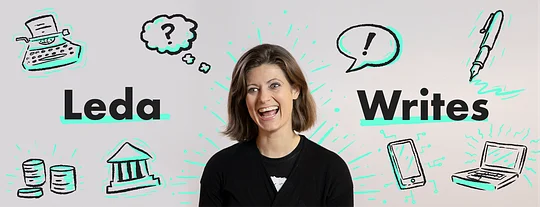Leda Writes for Fintech Futures: storytelling for introverts

Each week, Leda Glyptis, CEO of 11:FS Foundry, creates #LedaWrites. This week she discusses diversity and ensuring every voice in the room is heard.
When the lockdown kicked in, a meme started doing the rounds: “Check in with your extrovert friends. They are not ok.”
It was sent to me by a few friends, half in jest, with the question: are you ok?
And I sort of was. And sort of wasn’t.
Turns out that travelling the way I used to is more solitary than you realise, until you stop and think about it and, therefore, I had practice in being by myself for large parts of the day.
Occasionally for days on end. So lockdown was a familiar formula in a different format.
Still, as the days became weeks and the weeks became months, it all became harder.
Because I do love humans. Because I do my best thinking when interacting with others.
Because my mood lifts and soars when surrounded by people. Less so when left with my own thoughts, mid pandemic, with a mounting workload and diminishing creative stimuli.
And this is in the context in which I was hit with one of the most interesting questions I have received in a while. Interesting in its freshness – not only had I not been asked this before, I had also not thought about it before, not in that shape. And interesting in its implications.
We had been talking about COVID-related work conditions and their impact on team dynamics.
It was a webinar and the audience questions came from various angles and took us in various directions.
We had been talking about the challenges of joining a team that predated work from home, during the WFH era. Of being welcomed into a community of people who already share jokes and references that you don’t get the same opportunity to create with them because who ever became friends over Zoom?
“How are you settling in?” I asked one of my guys who started with us during the lockdown.
“Everyone is so welcoming,” he said. “The culture is amazing.”
But?
“It’s like a song I know the tune of but don’t yet know the words.” So true. And it’s hard to get to the words part because the human moments that punctuate the working life are absent.
“I don’t know how tall any of you are,” said my new guy. And I knew what he meant.
You can’t see one person’s futuristic coffee percolator and another’s box of hard-to-get-all-of-Italy-is-after-those cookies. The water bottle covered in elastic bands, the strange time of day people take their meals (this one is me), their weird habits, their bright coats and silly hats, the sound of their laugh. The sound of their voice when they speak in their mother tongue, to a co-national in the office, to their spouse or a friend on the phone.
“I don’t know how tall any of you are,” said my new guy. And I knew what he meant.
There is a story. I can see it unfolding. But I am not yet part of it.
It’s hard.
It is hard for extroverts. But, it turns out, it may be even harder for introverts.
Every human interaction is a series of actions and reactions, assumptions and habits.
Overarching narratives and personal storylines; team dynamics building ever-evolving stories that weave and morph, plotting the personal against the context of community, industry and society. The stories are actively being built but also constantly telling themselves: asserting their shapes in a way that is equally comforting and constraining.
Stories and narratives is how language works. How society works. How human interactions work. Stories upon stories creating expectations and shortcuts, shared references and fall-backs that help us decode, bestow meaning and navigate social situations. Shared assumptions. Inherited or built. Layers upon layers of them, interlocking, clashing, overlapping.
And these stories are helpful. They guide and contextualise us. But they also constrain us.
Terry Pratchett says it best. Stories need to tell themselves. They have their own dynamic.
They have impetus. They have their own rules and imperatives.
Every human interaction is a series of actions and reactions, assumptions and habits.
And the assumptions we all carry, the expectations we bring to the table, the narratives we expect, the narratives we build: they create structure, context, their own language. We exist within those narratives and when we arrive new and fresh to them, it takes some time to find our place. Find our groove. Work out the cadence.
And joining a team remotely puts one in a position of observer, audience member, even if they are invited to participate, it is harder to know when to step into the dance as you see less of the whole, less of the big picture.
So it’s hard.
And it’s particularly hard for the natural introverts, we were saying on the webinar, because it is neither obvious nor easy to project your personality and personhood again and again in successive 30min Zoom calls so your colleagues start building a sense of who you are, alongside getting a sense of what you do.
It’s not easy, that.
And then the question came: what about introverts from a diversity and inclusion perspective?
Do managers ignore introverts? Are introverts another group we should be thinking about and caring for?
Oh man. I mean. The easy answer is mostly not.
In most banks, teams are small enough that a good manager would be able to know and nurture even their introverts who don’t showboat.
But.
Your career progression and acceleration rarely comes from your manager, even if they do everything in their power to promote and support you. There is a wider stage in which you have to be noticed and appreciated. And being introverted doesn’t hugely help there.
But.
That is not the full story.
The full story says that if you are an introverted white man it’s hard because you live in a world of peacocks tooting their own horns and if you don’t, you are at a disadvantage, relatively speaking. But you are only competing with the showboats. You are not competing with the narrative itself. You are not competing against the fabric of established reality.
Prejudice exists in everyone. It is a composite of received wisdom, habit, assumptions and biases.
If you are an introverted woman. Or a person of colour. Or a difference bringer or difference maker or someone who would historically and traditionally not be in the seat you now occupy, then you always run the risk of being defined by whatever established narrative the organisation or your society or moment in time furnishes your audience with.
Now. That happens to all of us all the time. We step into a room and simultaneously step into a narrative (or many, come to think of it) that casts us into a role laden with expectations or limitations and the uphill struggle commences the second an interaction begins. It’s not always a battle. But it is always there.
Prejudice exists in everyone. It is a composite of received wisdom, habit, assumptions and biases. Personal preferences, family tropes, social landscapes. Thought and choice come into it, of course. But the narratives you step into are always bigger and heavier than the moment you are living out. And stories have a habit of needing to tell themselves. And if you don’t nudge and challenge and change them, they tell themselves the same way again and again and again. All over you, if you are not careful. And if you don’t like the part you’ve been dealt but can’t or won’t speak against it, they tell themselves at your expense, more often than not.
For every surgeon who’s been greeted by patients as a nurse because she’s an Asian woman; for every managing director who’s been asked if they are from IT support because they are Indian; for every black woman who has been asked to fetch coffees even though it was her meeting; for every woman who’s been blanked by a supplier searching the men in the room only to find out it’s her budget they are after. For every one of those stories that have happened to me or people I love, there are millions of stories like them.
And every introvert in those stories lives them out just as painfully as the extroverts. But with a heavier burden of inevitable repeatability.
Because let’s face it, the whole point about being different in a world of sameness is that you don’t just have to do your thing, against the grain.
The established narrative closes in all around you.
It’s that you have to loudly, constantly and in ways big and small change the story that everyone came into the room expecting. The story that is playing itself out in other rooms the world over. The story that we inherited and know only too well. The story we are going out to challenge and change.
Being the only non-white face in the room.
Being the only woman in the room.
Being the only one like you, whatever sets you apart, in the room.
It comes with its challenges. Getting there came with challenges. Being there came with challenges. Staying there comes with challenges.
And the one challenge we don’t talk about enough is that every day, every meeting, every encounter, every moment, no matter how much you have achieved and how far you have come, you come into a room where some new faces enter with some established wisdom.
Who expects you to be the nurse, not the surgeon. The IT support guy, not the decision-maker. And who also have a million assumptions about your relevance, your significance, the depth of your contribution, the value of your presence. Assumptions big and small. Mostly unspoken. Frequently soft and loosely held. Often insidious. Occasionally incendiary. Always heavy.
The established narrative closes in all around you.
Keeping your space open, the space that you need to carve out and you need to defend, isn’t just about doing your work and doing it well. It’s about doing the work, doing it well and re-telling the story to constantly write your part in it.
Daily.
Many times per day, needing to re-tell the space in which you legitimately operate.
This is not abstract.
Narratives and expectations frame our working lives, no matter who we are.
We all face them. And for those of us who champion change or represent change, having to unpick the narrative thread, re-set the scene is part of our daily bread. We turn up each day knowing we have to reclaim the narrative.
Every meeting. Every day. Every week. Every month. Every year.
It is never over.
And it is exhausting.
I have been yelled at in meetings by men who never raise their voices at each other.
We have to come in and, as well as doing the job, we have to subvert the trope. Change the narrative. Halt the story and replace it with something viable enough for everyone else to stay in play. Viable enough for us to stay in play.
It’s exhausting. It is constant. And it is not always smooth sailing.
I get talked over more than any man I know.
I have been yelled at in meetings by men who never raise their voices at each other.
It happened when I was young. It happens now. It happens to one of us every day. And I wish I could tell you I don’t let it. But that is not in my gift. Doing something about it is in my gift. Stopping it in its tracks is in my gift. Reacting is in my gift. For me and the next girl. Or boy. You know what I mean.
It is in my gift and it is my responsibility and my burden to tell and retell the story of what is ok. Of what my place is and what acceptable conduct is.
And this gets rewritten each day so, if I let it slide when the microaggressions happen, when the prejudiced narratives set the scene, then I have sold myself short. Then I have to occupy a space I was written into but don’t want to occupy. So I fight.
But not everyone is made of fire and brimstone.
Not everyone is made of flammable righteous indignation and a total disregard for the injuries they will amass on the journey.
Not everyone can live a life of constantly re-shaping the environment. And neither should they have to.
So are the introverts in danger of being ignored by their managers? Less so than we think.
Are the introverted women and people of colour, the introverted LGBTQ folks, the introverts whose own story and set of abilities does not fit established narratives, are they in danger of being ignored?
No.
They are in danger of being narrated over, their defining differences chiselled out of the story altogether and that is the worst thing of them all.
Not everyone can live a life of constantly re-shaping the environment. And neither should they have to.
Because they can’t tell their own story every minute of every day, like life demands, they can’t vocally challenge and channel the narrative with every breath, they can’t raise a loud voice and say, “hold up, that’s not my story. This is the story now.”
I read this quote by Denez Smith, recently: “Do you know what it’s like to live somewhere that loves you back?”
As an immigrant that resonated.
As a woman in a man’s industry, that resonated.
Not because the environment is always hostile. But because it doesn’t love us all back by default. It is still learning. And it’s learning on our time and on our backs. And it’s ok because the change will be good for us all and it is worth it.
But it is hard.
And hardest of all is the fact that you have to do the work while retelling the story of the world within which you do it, recasting the space you are allowed to occupy, re-setting the assumptions that sometimes yield easily and sometimes fight back. And the re-telling is not optional.
And for the introvert whose identity, biology, passport, gender or god knows what else sets them apart, for whom the ability to do this constant retelling may not be available even if the willingness is there, for them the world remains closed in a way that was true of us all a few years back.
And they should remain the dignified quiet banner of our bloody noisy mission: to make it ok, in our industry, in our offices, in our teams and our societies, to make it possible for folks to contribute to the best of their abilities, quietly if that is their way, without needing to fight people’s assumptions daily. And without the constant fear that you will be crushed, blocked, silenced or, even worse, effaced by the relentless inertia of established wisdom and familiar narrative.
So, for the allies and the extroverts of all hues, ethnicities, sexualities, identities and faiths, check on your introverted friends. They are cool. And they are ok. But the situation isn’t.
And until our own diversity is diverse, we are not done. Until our diversity can be safe in silence, we are not done.
And while we are not done, those of us who can need to keep doing the thing.
Keep re-casting the story. Keep protecting each other. And actively make spaces for people to be quietly yet profoundly differently themselves, because that’s its own story. And of all the stories playing out in offices and Zoom calls the world over, this is one that, once it gets enough momentum to be telling itself, will come with wonders we are yet to imagine.
For everyone.


